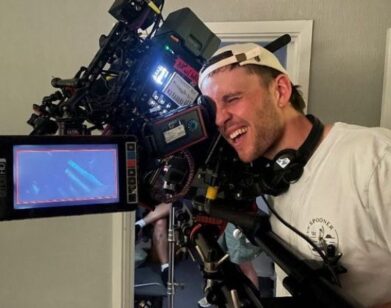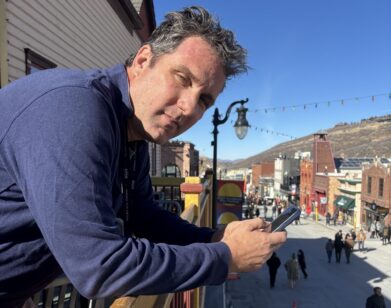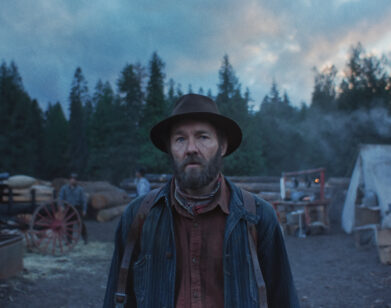BDSM
Joanna Arnow Tells Sean Baker How to Direct a Movie While Getting Spanked
On an early Zoom call before beginning production on her film The Feeling That the Time for Doing Something Has Passed, Joanna Arnow was asked if she’d consider casting sometime else in the lead role as Ann, an awkward, aloof and unassuming 30-something who drifts between multiple BDSM relationships. One of those asking was the filmmaker Sean Baker, an executive producer on the movie, but Arnow stuck to her guns. “This stupid industry is convinced that a film is more commercial with actors who are well-known,” he confessed to Arnow on a call last month before the film’s wide release. But it’s safe to say there was no one better equipped to play the role than the writer-director herself. “I couldn’t see anybody else playing this role,” Baker added. “So thank you for being that person and having that confidence.” The dry comedy, which opened last month to rave reviews and earned Arnow a nomination at the Film Independent Spirit Awards, follows a woman who punctuates her monotonous existence by pushing her own boundaries as a sexual submissive. While reveling in its warm critical reception, Arnow told Baker about directing her co-stars while getting spanked, how she came to cast her real-life parents in the movie, and what it’s like to see her film on the marquee at the IFC Center.
———
SEAN BAKER: Hi, Joanna. How are you?
JOANNA ARNOW: Hi, Sean. I’m good, how are you?
BAKER: It’s your opening weekend. How does it feel to have your film out in the world after basically an entire year? You premiered last year at Cannes around this time and it’s been a year of film festival travel and a wonderful Independent Spirit Award thrown in there.
ARNOW: It’s been exciting to show the film around and talk to audiences and hear their impressions. It gets laughs, so that’s my favorite thing. And also showing the film in theaters. I grew up going to IFC and Lincoln Center, so it means a lot to see the film’s title on the IFC marquee and getting to have a sold out screening. In my twenties, I went to so many films there, especially with the Stranger Than Fiction documentary series. I’ve never had a film there, so it feels really special.
BAKER: Do you recall the most outrageous reaction to your film over the last year? Has there been one that has really stood out?
ARNOW: There’s a Letterbox’d review somewhere that says “Nuke Brooklyn.” That’s it. That one springs to mind.
BAKER: The Letterbox’d reviews are amazing because there’s just no filter. They get right to it. I’ve never asked you this, so it’s okay if you don’t want to go there. But the BDSM community. I assume you’re a part of it. I don’t know to what degree. But did that change the way that you approached the representation in the film? Did you feel more responsible or less responsible to quote-unquote, “do right by the community”?
ARNOW: This film is autofiction, so it’s not autobiographical, but it does draw on personal experience, which includes involvement in the BDSM community. And yeah, absolutely, I didn’t go into making this film with representational politics in mind, but I did want to do right in my portrayal of BDSM. In my experience, people involved in BDSM have to be triply communicative and respectful. I wanted the film to reflect that. I think so many films that are depicting BDSM tend to pathologize it in some way, and I really wanted to show it in this non-judgmental fashion that isn’t necessarily saying one type of relationship is better than another but rather exploring a character who’s wrestling with both of them. And I also wanted to explore the humor that’s really inherent in BDSM and that a lot of the people in the community embrace. Role-playing is a game, ultimately. I wanted the film to play with that.
BAKER: It’s the light approach and the embrace of the humor that I think allows it to resonate even with audiences outside that community. Have you received reactions from the community regarding the film and the representation?
ARNOW: So far, everyone I’ve heard from who is involved with BDSM or the community in some way has responded really positively. I think there’s also just a non-judgmental-ness in the community which I really appreciate. There’s certain scenes where Elliot, the character who’s into the fuck-pig stuff, asks Anne if she needs aftercare every time. I feel like that character gets interpreted very negatively in certain reviews. But the way I see it is just being careful to communicate about needs and interests. Aftercare is part of the discussion, of course.
BAKER: Interesting. When they see someone like Elliot in a negative way, it reveals their own judgment of the community or of BDSM in general. I think that very often these reviews reveal the prejudices of the reviewers. Upon re-watching your film recently, and I don’t know if I’ve ever come across this before, but you were in such an incredibly unique position in my eyes because you were playing this character who is being submissive. So as the great actor that you are, you’re probably in character in these moments, but then you’re literally going to have to break out of character just to yell “cut” and literally flip your entire demeanor and be dominant. You’re going from bottom to top while you’re working and that’s insane. Was that difficult?
ARNOW: It was funny, especially in one of the spanking scenes. The team was so wonderful about making sure I had access to the monitor while being in the scene. One of our film’s producers, Graham Swan, and our AD, Coren [Helen-Gitomer], and cinematographer, Barton Cortright, were all handing me the monitor. One of the scenes, the spanking scene, I was bent over and they placed the monitor under me so I could see the framing and really be able to direct from this position. So yes, there’s some humor in the contrast, although I do think that ultimately, submissives are the ones in control. I see it as a powerful position to embrace that vulnerability and discuss what you want.
BAKER: Good point. I didn’t mean to generalize that way.
ARNOW: No, not at all. In our scene, Scott Cohen also thought that switch was really striking. His hand would be around my mouth and then we would finish the scene and I’d say “cut” in this muffled voice and switch to giving notes and thoughts.
BAKER: Oh gosh, that’s so funny. I hope there’s BTS footage of this. Just to switch subjects a little bit here. I remember early on when we were having a Zoom and we were all asking you in the politest way possible if you would consider somebody else for the role, just simply because this stupid industry is convinced that a film is more commercial with actors who are well-known. I’m like, “Why am I doing this to this poor filmmaker? I’m supposed to be supportive and yet I’m pushing this just for the sake of commercial value.” You were pretty stone cold. And then you just said, “Guys, no. I’m playing this role,.” And I was like, “Good for her. I’m an asshole for even pushing it. She knows what’s best for this film.” I couldn’t see anybody else playing this role. So thank you for being that person and having that confidence.
ARNOW: With this film, I wanted every scene to be interesting or funny and really think about connecting with the audience. I didn’t want this film to be too long. I didn’t want to leave people feeling like, “Oh, it would’ve been a good movie if it was 15 minutes shorter,” as painful as it was to cut it down from two hours to 88 minutes. I think it was about just making sure to make it the best film possible while staying true to itself and still engaging people throughout the whole film. Anyway, I don’t think that’s a bad question, seeing if someone else could have played the role, and I hope I said “no” nicely, too.
BAKER: You did.
ARNOW: Someone in the Q & A last night asked if I was going to act in my next films and I was like, “I would like to, but depending on the budget level, I am open to casting other people who might be a better practical fit.”
BAKER: I think the key is really just casting it for the right person and that’s it. And that right person can be an A-lister or that right person can be the person you’ve just met on the sidewalk who’s never thought about acting in his or her life. I wish that could be the way. I also know that working with seasoned actors is an amazing thing, so I’m looking forward to seeing who you gravitate towards in the future. But talking about first timers or non-professionals, your parents are in the film and I know they’re playing versions of themselves. I don’t think I’d be making films if it wasn’t for the support of my parents. Actually, my mother introduced me to movies when she brought me to the local library when I was young and I saw James Whale’s Frankenstein, although now she doesn’t even see my films anymore because of the subject matter that I gravitate towards. Just recently she saw Barbie and she asked me why I couldn’t make movies like that. So I want to ask you about your parents. Have they always been supportive of your artistic endeavors?
ARNOW: Yeah, they were up to participate in my personal documentary, I Hate Myself – Smiley Face, back in the day. Although I think when I got started with making documentaries, they were hoping that I would be more of a Michael Moore type documentarian and explore some hard-hitting leftist topics. It’s complicated, but I was very excited when they volunteered for the roles in this one. I did a test shoot for framing and pacing that they acted in. I think they saw that the characters seemed familiar and my mother mentioned that she would be up to act if I needed someone. They both had been so amazing in that test shoot that I was delighted it was on the table.
BAKER: Do they have strong opinions?
ARNOW: Yes, they have very strong opinions. There were some heated discussions about the characters and how they were being portrayed, but they were very supportive. We actually filmed in their own home. But I don’t believe they’re going to see the final film.
BAKER: They still haven’t seen it?
ARNOW: No, and I don’t think they’re going to. But I’ve shown them their scenes. There’s quite a lot of simulated sex scenes with me, so I haven’t really been encouraging them. I’ve told them about the material and left it to them to decide.







